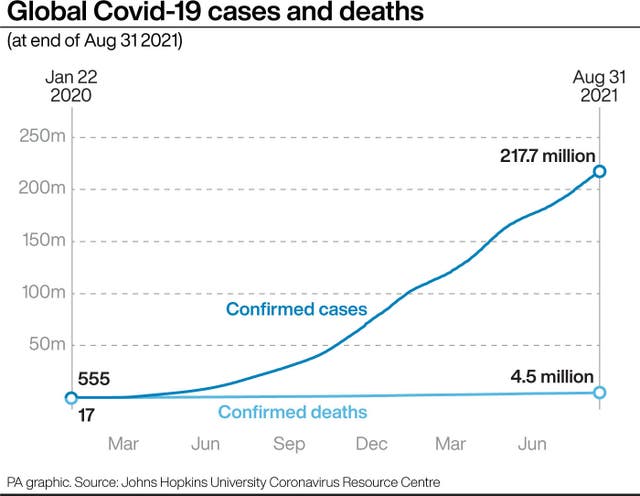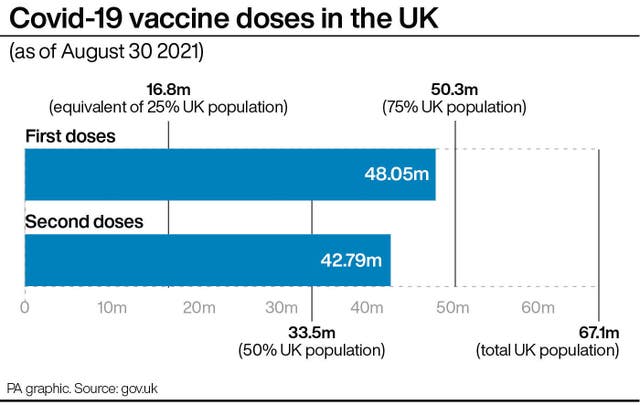
Booster doses could be given to those most vulnerable to Covid-19 but their use should not be “widespread” an expert advising the Government has said.
The Joint Committee on Vaccination and Immunisation (JCVI) is preparing to make a final decision about the booster campaign, with the NHS in England poised to start it from September 6.
On Tuesday, the Prime Minister’s official spokesman said it is “still very much our intention to roll out the booster programme” this month.
Professor Andrew Hayward, a member of the New and Emerging Respiratory Virus Threats Advisory Group, said there must be careful thought given to the use of any booster doses when many people in the UK have been double-jabbed already.
He told BBC Radio 4’s Today programme: “I think we do need to think very carefully about, now that we’ve vaccinated and protected the great majority of the vulnerable people within our country, about how we use booster doses, and certainly I think that would, from an ethical, global perspective, we would not want that to be widespread.
“I think there is a case for vaccinating the most vulnerable again with booster doses, but that still leaves the UK massively over-ordered in terms of the amount of vaccines that it has, and still conservatively leaves somewhere between 100 and 200 million doses that it could donate by the end of the year.”
 (PA Graphics)
(PA Graphics)
Prof Hayward warned that the lack of global vaccination coverage “will continue to have a huge drain on the global economy”.
He said: “It’s estimated that that could cost the global economy somewhere like nine trillion dollars.”
The professor said while the G7 pledged one billion vaccine donations towards the global vaccination scheme, the need is “more like 11 billion”, adding “so it’s only a small percentage of what is needed to protect the rest of the world”.
The Department of Health confirmed at the weekend that preparations are under way to ensure the health service is ready to offer jabs to all 12 to 15-year-olds in England from early September.
But the Independent newspaper reported there are concerns in the JCVI about the effect recommending vaccines for younger people could have on any booster programme for the most vulnerable.
Currently 12 to 15-year-olds with specific underlying health conditions and those who are household contacts of someone who is immunosuppressed are eligible for a vaccine.
No decision has been given yet on an extension to include all healthy people in this age bracket.
 (PA Graphics)
(PA Graphics)
Geoff Barton, general secretary of the Association of School and College Leaders (ASCL), has called on the JCVI to make a decision about whether vaccines for younger pupils should happen.
Meanwhile, one of the people behind the Oxford AstraZeneca coronavirus vaccine said the best global protection would be achieved by everyone around the world having a first dose, rather than some people getting three jabs.
Dame Sarah Gilbert, professor of vaccinology at the University of Oxford’s Jenner Institute, who has won a Heroes Of The Year Award from GQ, told the magazine: “The most impact from the vaccine is with the first dose. We get really high protection with the first dose, then it improves with the second.
“So if you want to think about getting the most protection across the world, vaccinate everybody once, rather than some people three times.”
Dame Sarah added that there is “always going to be another pandemic”, and said investment is needed to ensure better preparedness for the next one.



Why are you making commenting on The Herald only available to subscribers?
It should have been a safe space for informed debate, somewhere for readers to discuss issues around the biggest stories of the day, but all too often the below the line comments on most websites have become bogged down by off-topic discussions and abuse.
heraldscotland.com is tackling this problem by allowing only subscribers to comment.
We are doing this to improve the experience for our loyal readers and we believe it will reduce the ability of trolls and troublemakers, who occasionally find their way onto our site, to abuse our journalists and readers. We also hope it will help the comments section fulfil its promise as a part of Scotland's conversation with itself.
We are lucky at The Herald. We are read by an informed, educated readership who can add their knowledge and insights to our stories.
That is invaluable.
We are making the subscriber-only change to support our valued readers, who tell us they don't want the site cluttered up with irrelevant comments, untruths and abuse.
In the past, the journalist’s job was to collect and distribute information to the audience. Technology means that readers can shape a discussion. We look forward to hearing from you on heraldscotland.com
Comments & Moderation
Readers’ comments: You are personally liable for the content of any comments you upload to this website, so please act responsibly. We do not pre-moderate or monitor readers’ comments appearing on our websites, but we do post-moderate in response to complaints we receive or otherwise when a potential problem comes to our attention. You can make a complaint by using the ‘report this post’ link . We may then apply our discretion under the user terms to amend or delete comments.
Post moderation is undertaken full-time 9am-6pm on weekdays, and on a part-time basis outwith those hours.
Read the rules here